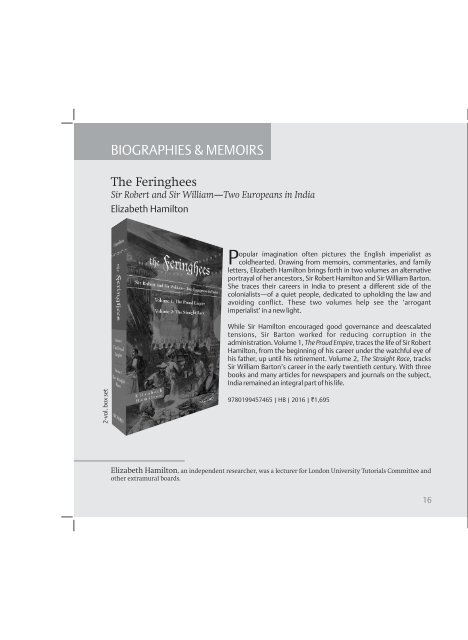Create successful ePaper yourself
Turn your PDF publications into a flip-book with our unique Google optimized e-Paper software.
BIOGRAPHIES & MEMOIRS<br />
FILM & MEDIA STUDIES<br />
2-vol. box set<br />
The Feringhees<br />
Sir Robert and Sir William—Two Europeans in India<br />
Elizabeth Hamilton<br />
Popular imagination often pictures the English imperialist as<br />
coldhearted. Drawing from memoirs, commentaries, and family<br />
letters, Elizabeth Hamilton brings forth in two volumes an alternative<br />
portrayal of her ancestors, Sir Robert Hamilton and Sir William Barton.<br />
She traces their careers in India to present a different side of the<br />
colonialists—of a quiet people, dedicated to upholding the law and<br />
avoiding conflict. These two volumes help see the ‘arrogant<br />
imperialist’ in a new light.<br />
While Sir Hamilton encouraged good governance and deescalated<br />
tensions, Sir Barton worked for reducing corruption in the<br />
administration. Volume 1, The Proud Empire, traces the life of Sir Robert<br />
Hamilton, from the beginning of his career under the watchful eye of<br />
his father, up until his retirement. Volume 2, The Straight Race, tracks<br />
Sir William Barton’s career in the early twentieth century. With three<br />
books and many articles for newspapers and journals on the subject,<br />
India remained an integral part of his life.<br />
9780199457465 | HB | 2016 | `1,695<br />
Elizabeth Hamilton, an independent researcher, was a lecturer for London University Tutorials Committee and<br />
other extramural boards.<br />
16<br />
SRK and Global Bollywood<br />
Fingerprinting Popular Culture<br />
The Mythic and the Iconic in Indian Cinema<br />
Vinay Lal and Ashis Nandy (eds)<br />
9780195692679 | OIP | 2007 | `350<br />
Popular cinema, in recent times, has become for the middle class both an ideological<br />
phalanx and a major vehicle of self-expression. The media-exposed public has in turn<br />
become more accessible through the mythic structures and larger-than-life figures of popular<br />
cinema. The medium has become a new, more powerful language of public discourse.<br />
Fingerprinting Popular Culture is a product of this awareness. It uses Indian popular cinema to reexamine<br />
the relationship between society, politics, and culture.<br />
‘... it makes for some interesting reading, especially if one is looking for some serious and academic discourse on cinema’s<br />
impact on Indian society and vice versa.’ —Deccan Herald<br />
‘The contributors to this volume are known for their erudition on the subject. ... [T]he anthology is not without insights.’<br />
—The Hindu<br />
Rajinder Dudrah, Elke Mader, and Berhard Fuchs (eds)<br />
The past few decades of accelerated globalization has revealed a strong preoccupation<br />
with film stars and celebrity culture in India, and in this context Shah Rukh Khan, aka SRK,<br />
has emerged as an important figure. As an actor, entrepreneur, and icon for India and<br />
‘Indianness’, his appeal cuts across regional, linguistic, and national boundaries.<br />
This collection of essays draws attention to the ways in which SRK’s stardom acts as an<br />
emblem for diasporic and transnational desires in modern India and beyond.<br />
Rajinder Dudrah<br />
Elke Mader<br />
Bernhard Fuchs<br />
Austria.<br />
17<br />
s<br />
is enior lecturer in Screen Studies at the University of Manchester, UK.<br />
is professor of Social and Cultural Anthropology, University of Vienna, Austria.<br />
is faculty with the Department of European Ethnology, University of Vienna,<br />
9780199460472 | HB | 2015 | `995


